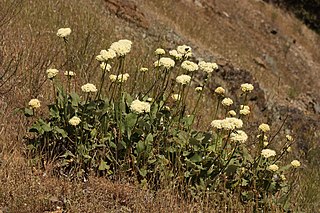
Eriogonum is a genus of flowering plants in the family Polygonaceae. The genus is found in North America and is known as wild buckwheat. This is a highly species-rich genus, and indications are that active speciation is continuing. It includes some common wildflowers such as the California buckwheat.
Eriogonum truncatum, the Mount Diablo buckwheat, is a small pink wildflower, believed to have been extinct since 1936 until its rediscovery in 2005. The species is only known to live on Mount Diablo in Contra Costa County, northern California.

Eriogonum fasciculatum is a species of wild buckwheat known by the common names California buckwheat and flat-topped buckwheat. This plant is a widespread and variable shrub of great benefit across its various habitats, providing an important food resource for a diversity of insect and mammal species. It also provides numerous ecosystem services for humans, including erosion control, post-fire mitigation, increases in crop yields when planted in hedgerows, and high habitat restoration value.

Eriogonum arborescens is a species of wild buckwheat known by the common name Santa Cruz Island buckwheat.
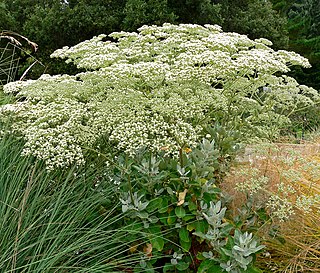
Eriogonum giganteum, with the common name St. Catherine's lace, is a species of wild buckwheat in Southern California.
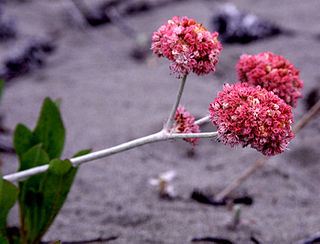
Eriogonum latifolium is a species of wild buckwheat known by the common names seaside buckwheat and coast buckwheat. This plant is native to the coastline of the western United States from Washington to central California, where it is a common resident of coastal bluffs and scrub.

Eriogonum ovalifolium is a species of wild buckwheat known by the common name cushion buckwheat. It is native to western North America from California to Alberta, where it is a member of many plant communities in varied habitats, including the sagebrush steppe and alpine regions.
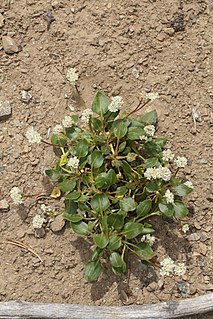
Eriogonum pyrolifolium is a species of wild buckwheat. It is native to western North America, from British Columbia to the high mountains of California.

Eriogonum wrightii is a species of wild buckwheat known by the common names bastardsage and Wright's buckwheat. It is native to the Southwestern United States, California, and northwest Mexico, where it grows in many plant communities, such as chaparral, in rocky habitats from mountains to deserts.
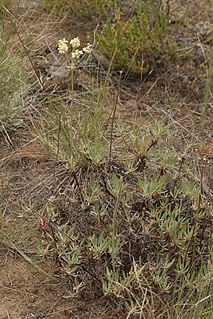
Eriogonum heracleoides is a plant of western North America that has many flowering clusters which are usually cream colored, or off-white. It can usually be found in rocky areas, such as sagebrush deserts and Ponderosa pine forests. Parsnipflower buckwheat is in the genus Eriogonum and the family Polygonaceae, which is a family of plants known as the "knotweed family". It inhabits much of the western part of the United States and southern British Columbia.

Eriogonum brachyanthum is a species of wild buckwheat that is commonly known as shortflower buckwheat. It is native to eastern California and western Nevada, particularly the Mojave Desert region, where it is common to abundant, and even sometimes weedy. It is also known from southern Oregon. The plant grows in sandy habitats such as desert flats and sagebrush. It also grows in pinyon-juniper and montane conifer woodlands. It is an annual herb that grows 30 to 40 centimeters tall. Leaves are located at the base of the stem, woolly, and oval or rounded in shape. The top of the stem is occupied by a branching inflorescence bearing many widely spaced clusters of flowers. Each individual flower is about a millimeter wide and light yellow in color. Flowers bloom from April to November.

Eriogonum butterworthianum is a rare species of wild buckwheat known by the common name Butterworth's buckwheat. It is endemic to the Santa Lucia Mountains of central Monterey County, California, where it is known from a few occurrences in the wilderness southeast of Big Sur in the vicinity of Junipero Serra Peak. Its native habitats include oak and conifer woodlands, chaparral communities, and sandstone outcrops. Eriogonum butterworthianum is a small clumpy shrub or subshrub that grows up to about 30 centimeters tall and wide. Leaves are 2 centimeters long and reddish-green in color. They are woolly, oval in shape, and curled under at the edges. The inflorescence is a cluster of flowers up to 2 or 3 centimeters wide. Each individual flower is a few millimeters wide and dull yellowish to pinkish in color. Flowers bloom June to September.
Eriogonum deserticola is a species of wild buckwheat known by the common name Colorado Desert buckwheat.

Eriogonum sphaerocephalum is a species of wild buckwheat known by the common names rock buckwheat and round-headed desert buckwheat. It is native to the western United States.
Eriogonum diatomaceum is a species of wild buckwheat known by the common name Churchill Narrows buckwheat. It is endemic to Nevada in the United States, where it is known only from the Pine Nut Mountains in Lyon County. It is limited to the Churchill Narrows near Fort Churchill State Historic Park. This plant was discovered in 1997 and described to science in 2002.
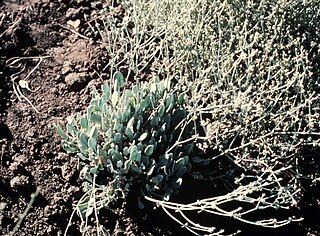
Eriogonum niveum is a species of flowering plant in the buckwheat family known by the common name snow buckwheat. It is native to the Pacific Northwest of North America, where it occurs in British Columbia, Washington, Oregon, and Idaho. It flowers late in the summer.

Eriogonum thymoides is an "abundant" species of flowering plant in the buckwheat family known by the common name thymeleaf wild buckwheat, or simply thymeleaf buckwheat.

Eriogonum abertianum, with the common names Abert's buckwheat and Abert wild buckwheat, is a species of buckwheats in the family Polygonaceae.
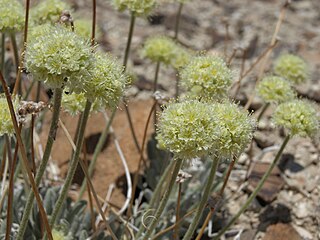
Eriogonum tiehmii, known as Tiehm's buckwheat, is a species of flowering plant endemic to the Silver Peak Range of Esmeralda County, Nevada in the United States. Its only known population is at high risk of destruction due to proposed mining for lithium by Australian company Ioneer; a significant portion of the population was destroyed in 2020.
















